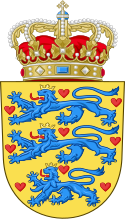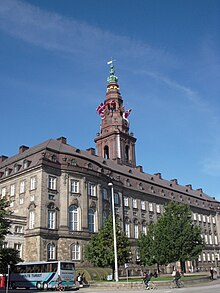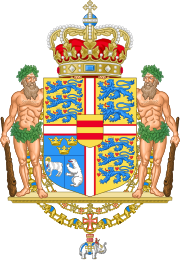
Back سياسة الدنمارك Arabic Държавно устройство на Кралство Дания Bulgarian ডেনমার্কের রাজনীতি Bengali/Bangla Politický systém Dánska Czech Danmarks politik Danish Politisches System Dänemarks German Política de Dinamarca Spanish Taani poliitika Estonian سیاست در دانمارک Persian Politique au Danemark French
Politics of Denmark Dansk politik | |
|---|---|
 | |
| Polity type | Unitary parliamentary constitutional monarchy |
| Constitution | Constitution of Denmark |
| Legislative branch | |
| Name | Parliament |
| Type | Unicameral |
| Meeting place | Christiansborg Palace |
| Presiding officer | Søren Gade, Speaker of the Parliament |
| Executive branch | |
| Head of State | |
| Title | Monarch |
| Currently | Frederik X |
| Appointer | Hereditary |
| Head of Government | |
| Title | Prime Minister |
| Currently | Mette Frederiksen |
| Appointer | Monarch |
| Cabinet | |
| Name | Cabinet of Denmark |
| Current cabinet | Frederiksen II Cabinet |
| Leader | Prime Minister |
| Ministries | 18 |
| Judicial branch | |
| Name | General Judicial System |
| Courts | Courts of Denmark |
| Supreme Court | |
| Chief judge | Thomas Rørdam |

 |
|---|
The politics of Denmark take place within the framework of a parliamentary representative democracy, a constitutional monarchy and a decentralised unitary state in which the monarch of Denmark, King Frederik X, is the head of state.[1] Denmark is a nation state. Danish politics and governance are characterized by a common striving for broad consensus on important issues, within both the political community and society as a whole.
Executive power is exercised by the cabinet of Denmark (commonly known as "the Government", Danish: regeringen), presided over by the Prime Minister (statsminister) who is first among equals. Legislative power is exercised by the Folketing, the unicameral parliament, and secondarily by the Cabinet. Members of the judiciary are nominated by the executive (conventionally by recommendation of the judiciary itself), formally appointed by the monarch and employed until retirement.
Denmark has a multi-party system, with two large parties, and several other small but significant parties. No single party has held an absolute majority in the Folketing since the beginning of the 20th century.[2] Thirteen parties have ballot access for the 2019 Danish general election, three of which did not contest 2015 general election. Since only four post-war coalition governments have enjoyed a majority, government bills rarely become law without negotiations and compromise with both supporting and opposition parties. Hence, the Folketing tends to be more powerful than legislatures in other EU countries. The Constitution does not grant the judiciary power of judicial review of legislation; however, the courts have asserted this power with the consent of the other branches of government. Since there are no constitutional or administrative courts, the Supreme Court also deals with constitutional matters.
On many issues the political parties tend to opt for co-operation, and the Danish state welfare model receives broad parliamentary support. This ensures a focus on public-sector efficiency and devolved responsibilities of local government on regional and municipal levels.
The degree of transparency and accountability is reflected in the public's high level of satisfaction with the political institutions, while Denmark is also regularly considered one of the least corrupt countries in the world by international organizations.[3] The Economist Intelligence Unit rated Denmark as "full democracy" in 2016.[4] According to the V-Dem Democracy indices Denmark is 2023 the most electoral democratic country in the world.[5]
- ^ Munk Christiansen, Peter; Elklit, Jørgen; Nedergaard, Peter, eds. (2020). The Oxford Handbook of Danish Politics (1 ed.). Oxford University Press. doi:10.1093/oxfordhb/9780198833598.001.0001. ISBN 978-0-19-883359-8.
- ^ Cite error: The named reference
Denmark2011was invoked but never defined (see the help page). - ^ Corruption Perceptions Index 2012 from Transparency International
- ^ solutions, EIU digital. "Democracy Index 2016 - The Economist Intelligence Unit". www.eiu.com. Retrieved 2017-11-29.
- ^ V-Dem Institute (2023). "The V-Dem Dataset". Retrieved 14 October 2023.
© MMXXIII Rich X Search. We shall prevail. All rights reserved. Rich X Search